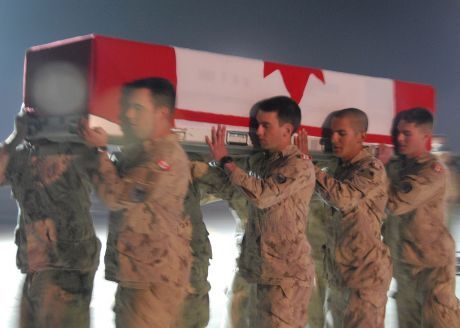News
You are here
Afghanistan papers: The anti-war movement was right…. again

December 10, 2019
October 2019 marked 18 years since the beginning of the war in Afghanistan. US troops being deployed earlier this year were not born when the war started. This is the longest combat deployment in US history and has resulted in tens of thousands of Afghan civilians killed, more than 2000 US and 159 Canadian soldiers killed. Almost as many Canadian soldiers have died by suicide since returning.
Afghan civilian deaths continue to mount each day. In August a wedding procession was bombed killing 63 people. In November another 13 were killed at another wedding. The airstrikes and the brutal occupation of various sections of the country remain a daily plague for the Afghan people.
For most observers this seemed, at the very least, to be a futile endeavour that would never see the type of peaceful society we were told would come from the effort.
However, those who challenged the war were presented with constant misinformation about how the war was going. In Canada, the Liberal governments and the Harper Tories both told us that the war was going well and we were bringing peace and stability to the country. In fact, current Defence minister Harjit Sajjan still maintans that it was worth it for Canada to take part.
Over the decades, we saw polls showing that a majority of Afghans welcomed Canada’s presence and these studies were given virtually no scrutiny by the media. There was, for example a poll conducted for CBC at the height of Canada’s combat role in Kandahar which found 67 percent of respondents were happy with Canada’s actions in Afghanistan. The poll was deeply flawed (it also showed only 6 percent of respondents knew Canada was even there) but it became the basis for more pro-war propaganda in Canada.
The gap between government propaganda about the war and the obvious lack of “progress”, it seems, was not unique to Canada.
The Afghanistan papers
The Washington Post has just released a trove of documents - 2000 pages in all - that consist of interviews, reports and intelligence assessments showing that the US government consistently lied about how the war was going. They knew it was futile and would never be “won” in any measurable sense. But they continued with the war and told us the end was in sight.
It took the Post three years of legal battles before the documents were released. And you can see why the US military worked so hard to hide the papers. They represent a scathing indictment of the whole US war machine. They are the Pentagon papers of this generation.
The documents are a collection of information gathered by the Special Inspector General for Afghanistan Reconstruction (Sigar) whose job it was to assess policy wins or losses in relation to the conflict.
What they found was staggering. A systematic and consistent misinformation campaign to try and convince the world that the war was being won.
Bob Crowley, an army colonel and adviser to US military commanders in 2013 and 2014 is quoted in the documents as saying, “Every data point was altered to present the best picture possible. Surveys, for instance, were totally unreliable but reinforced that everything we were doing was right and we became a self-licking ice-cream cone.”
The documents point to widespread corruption in the Afghan government and army. For observers watching the war begin in 2001, this is no surprise. The US government under George W Bush was intent on a quick war in Afghanistan so they could move onto their main target, Iraq. So they decided to put the drug warlords in power - and then were surprised that Afghanistan turned into a corrupt narco-state where government officials became the biggest drug dealers in the country.
The corruption in the country should not, however be seen as a uniquely Afghan phenomena. Corruption was a central feature of the entire conflict and the US led the way. In the 2006 document Afghanistan inc, we see comprehensive and widespread corruption coming from the occupation forces themselves as well as from western based corporations that pillaged the country for profit.
Afghanistan and Imperialism
The documents speak to decades of futility as NATO forces attempted to pacify the country but the failures for NATO in Afghanistan were not simply because of policy mistakes. The goals in this war were never to create a peaceful nation of free and fair democracy. Nor was this war about liberating the women of Afghanistan - as is so consistently suggested.
This was was about imperial rivalry and maintenance of US power globally. It was a war to control a strategic bloc of land between potential rivals like China and those who had resisted US domination like Iran.
The whole war on terror was, likewise, about control of strategic areas and or resources like oil. Current US president Donald Trump has been weirdly honest about this when speaking about the deployment of US forces in Syria. Speaking at the recent NATO conference Trump said, "Right now, the only soldiers we have in that area are essentially the soldiers that are keeping the oil. So we have the oil. And we can do with the oil what we want.”
When the Pentagon Papers were released in 1971 it sparked a massive growth of the anti-war movement in the US. People were shocked to hear that their government had lied about the conduct and the prospects of the war in Vietnam. There is less shock this time around - we have lived through decades where governments lying to us is a given.
But the Afghanistan papers and the ongoing chaos in other regions affected by the “war on terror” from Iraq to Libya should go some way to reducing support for American led imperialism. They at the very least provide anti-imperialists with more ammunition to challenge the pro-war agenda of our governments. And it should give pause to those intent on going to war on flimsy pretences in the future.
Section:
Topics:










